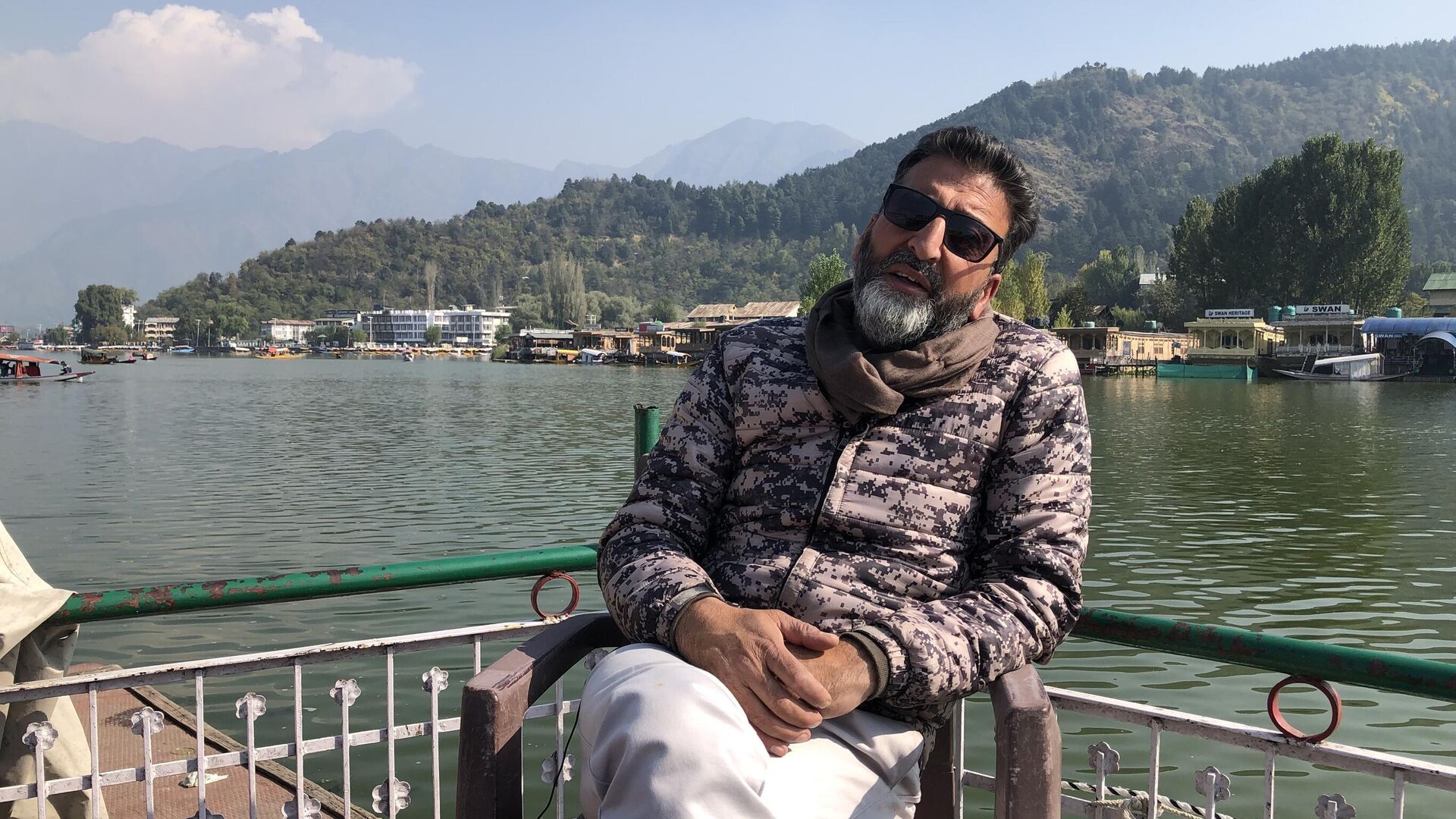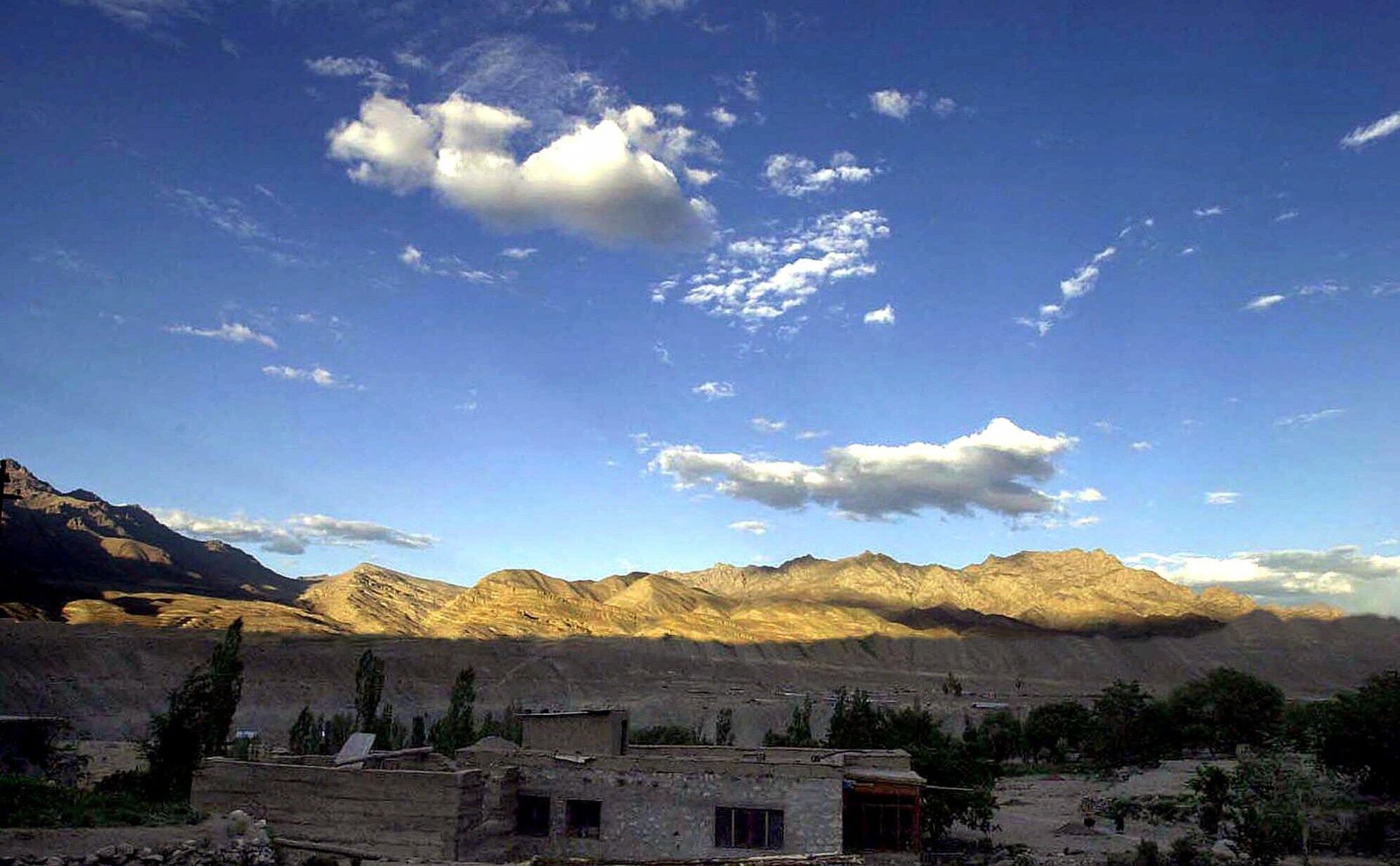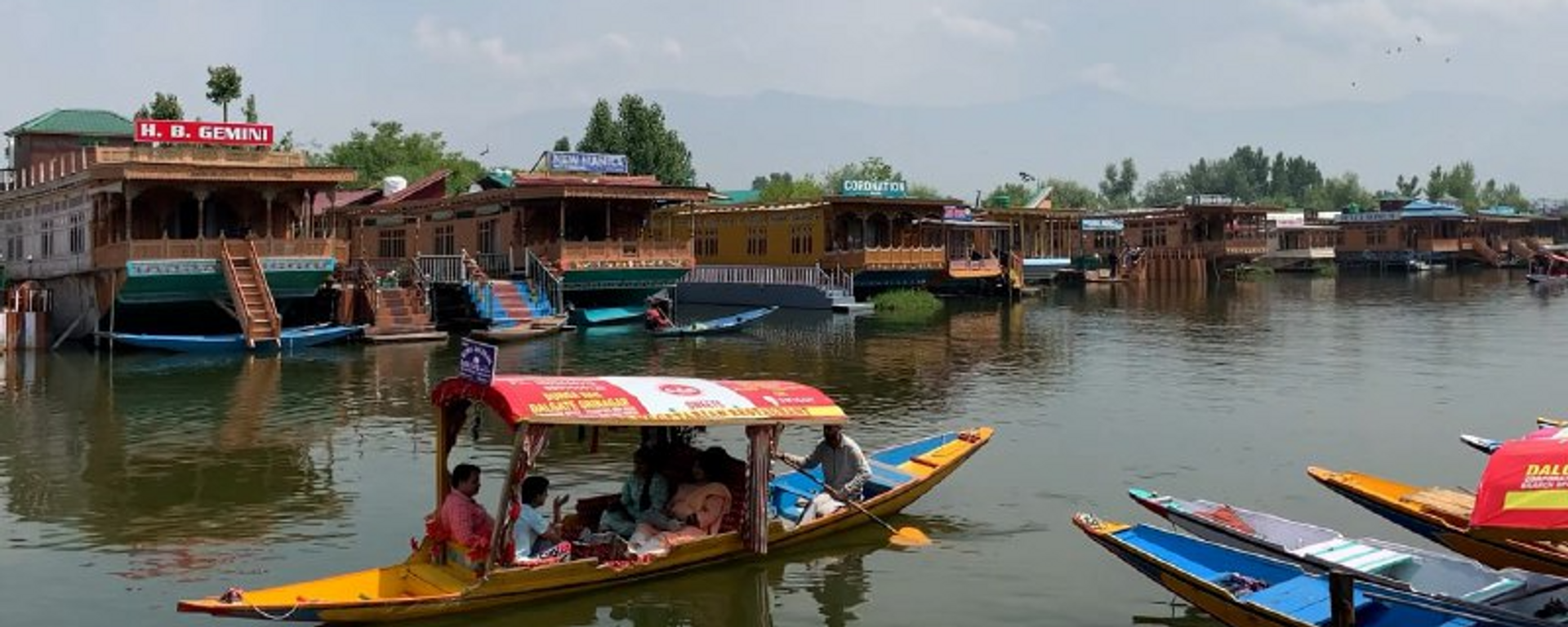https://sputniknews.in/20231027/twist-of-fate-how-did-houseboat-owner-become-heroic-rescuer-5092944.html
Twist of Fate: How Houseboat Owner Became Water Rescue Hero
Twist of Fate: How Houseboat Owner Became Water Rescue Hero
Sputnik India
Tariq Patloo, a 54-year-old resident of Srinagar city is a houseboat owner. Currently Patloo is an environment activist, an ambulance driver and a volunteer offering rescue services to his community.
2023-10-27T17:30+0530
2023-10-27T17:30+0530
2023-10-28T11:34+0530
jammu and kashmir (j&k)
health crisis
covid-19
tourism
india
delhi
srinagar
health issues
health
cultural heritage
https://cdn1.img.sputniknews.in/img/07e7/0a/1b/5092780_0:257:2730:1793_1920x0_80_0_0_f7a5fc171f50f4c8c847e43a29689946.jpg
When Tariq Patloo was a teenager in 1985, his father passed away in an accident. As a third-generation houseboat owner, Patloo had to take up the family business catering to foreign tourists who visited the Kashmir region. This happened at a time when staying on the famous houseboats on Dal Lake in Srinagar city was a must for tourists.Then in 1989, an armed militant movement swept the region, with thousands of young people joining the insurgency to either create a separate country for Kashmir or merge the region entirely with Pakistan.As foreign nations started releasing travel alerts for individuals intending to visit Kashmir, the local tourism industry rapidly declined.Family and Business TransitionPatloo employed staff to manage the houseboat. The small-scale entrepreneur relocated to the Indian capital of New Delhi to work as a tour guide. From there, Patloo would conduct tours, albeit with some flexibility. Patloo and many other guides would take hold of foreign tourists in Delhi and try to convince them to visit Kashmir.The 1995 abduction of six Western tourists and two guides in Kashmir by the militant group Al-Faran severely impacted tourism in the region as travellers became hesitant to visit. One tourist from Norway was beheaded, another from the United States managed to escape, and the rest were never found and presumed dead. Despite the kidnapping's notoriety, Patloo continued to travel between Delhi and Kashmir for over a decade. However, their business did not prosper.Return to KashmirBy 2009, militancy in Kashmir had subsided, and Patloo decided to return. His return was not the homecoming he expected. Patloo saw the tourism industry as a shadow of its former glory.Almost 14 years later, Patloo, a houseboat owner, has had to take on many roles. Currently, Patloo is an environmental activist, an ambulance driver, and a volunteer who provides rescue services to his community. He belongs to the Dal community, also known as Haanji in local parlance.Serving Community in Times of CrisisCleaning the Dal was just one aspect of Patloo's transformation. In 2020, amidst the COVID-19 pandemic that affected the whole world, Patloo unfortunately fell ill and was hospitalized due to the severity of his condition.During his illness, Patloo recognized the magnitude of the pandemic and determined that he would purchase a privately-owned boat to function as an ambulance for his disregarded community. This one-of-a-kind floating ambulance would access areas of the Dal that the authorities often fail to reach in a timely manner.In one instance, Patloo and a relative utilized his ambulance to assist in arranging the burial of a 26-year-old woman who passed away due to COVID-19 and was left unattended by her family until her in-laws arrived to perform the final rites.In another instance, he received an SOS call from a mother-son pair afflicted by COVID. They lacked medication and caretakers.Becoming Water Rescue HeroThe pandemic may have passed, but Patloo soon realized that the problems facing the water-dwelling community were far from over. With each passing day, he found himself getting more involved than before. Winters in Kashmir can be harsh and snowy, and boats are known to sink under the weight of snow. In some cases, the vessels catch fire due to poorly-made heating equipment.The 54-year-old made the decision to employ his ambulance as a rescue vessel. "I've had to rescue people at least 200 times", he stated.His ambulance and rescue boat now includes an oxygen concentrator, wheelchair, stretcher, water pipe, water motor, and other necessary items.Community ChallengesPatloo did, however, acknowledge certain government initiatives, such as the construction of a lakewide sewage system. He said his community has been marginalized by the elite and stigmatized to the extent that people use the name of their community as a slur. Foreigners don't want to get married in their community, Patloo added.
https://sputniknews.in/20230607/india-risks-losing-unique-cultural-heritage-as-houseboats-of-srinagar-are-sinking-2376532.html
jammu and kashmir (j&k)
india
delhi
srinagar
pakistan
Sputnik India
feedback.hindi@sputniknews.com
+74956456601
MIA „Rossiya Segodnya“
2023
Azaan Javaid
https://cdn1.img.sputniknews.in/img/07e6/0c/08/19280_0:0:1080:1080_100x100_80_0_0_d0f3f10ac6f30fb5b9e5e21a5e2536ea.jpg
Azaan Javaid
https://cdn1.img.sputniknews.in/img/07e6/0c/08/19280_0:0:1080:1080_100x100_80_0_0_d0f3f10ac6f30fb5b9e5e21a5e2536ea.jpg
News
en_IN
Sputnik India
feedback.hindi@sputniknews.com
+74956456601
MIA „Rossiya Segodnya“
Houseboat Owner
Sputnik India
Houseboat Owner
2023-10-27T17:30+0530
true
PT4M08S
Sputnik India
feedback.hindi@sputniknews.com
+74956456601
MIA „Rossiya Segodnya“
Azaan Javaid
https://cdn1.img.sputniknews.in/img/07e6/0c/08/19280_0:0:1080:1080_100x100_80_0_0_d0f3f10ac6f30fb5b9e5e21a5e2536ea.jpg
covid 19 pandemic, health crisis, jammu and kashmir, india tourism, dal lake, floating ambulance, heroes of india, exapmples of personal heroism in india, how indians have fought the covid pandemic, indians self-sacrifice, saviours of india, water ambulance, from entrepreneur to health activist, kashir, health, pandemic survival, india tourism in kashmir, dal lake community, floating ambulance reality
covid 19 pandemic, health crisis, jammu and kashmir, india tourism, dal lake, floating ambulance, heroes of india, exapmples of personal heroism in india, how indians have fought the covid pandemic, indians self-sacrifice, saviours of india, water ambulance, from entrepreneur to health activist, kashir, health, pandemic survival, india tourism in kashmir, dal lake community, floating ambulance reality
Twist of Fate: How Houseboat Owner Became Water Rescue Hero
17:30 27.10.2023 (Updated: 11:34 28.10.2023) Tariq Patloo is a third-generation houseboat owner. Circumstances have forced him to wear many hats, including the role of tour guide, activist, and rescue worker.
When
Tariq Patloo was a teenager in 1985, his father passed away in an accident. As a third-generation
houseboat owner, Patloo had to take up the family business catering to foreign tourists who visited the Kashmir region. This happened at a time when staying on the famous houseboats on Dal Lake in Srinagar city was
a must for tourists.
Then in 1989, an armed
militant movement swept the region, with thousands of young people joining the insurgency to either create a separate country for Kashmir or merge the region entirely with Pakistan.
As foreign nations started releasing travel alerts for individuals intending to visit Kashmir, the local tourism industry rapidly declined.
Family and Business Transition
Patloo employed staff to manage the houseboat. The small-scale entrepreneur relocated to the Indian capital of
New Delhi to work as a tour guide.
From there, Patloo would conduct tours, albeit with some flexibility. Patloo and many other guides would take hold of foreign tourists in Delhi and try to convince them to visit Kashmir.
"Most of the tourists had advisories asking them not to visit Kashmir. So we would not mention Kashmir. We would show them photographs of local places in Kashmir without telling them they were in Kashmir. We would take safe routes and make sure that our guests were as comfortable and safe as possible", Patloo told Sputnik India.
The 1995 abduction of six Western tourists and two guides in Kashmir by the militant group Al-Faran severely impacted tourism in the region as travellers became hesitant to visit. One tourist from
Norway was beheaded, another from the United States managed to escape, and the rest were never found and presumed dead.
Despite the kidnapping's notoriety, Patloo continued to travel between Delhi and Kashmir for over a decade. However, their business did not prosper.
By 2009, militancy in Kashmir
had subsided, and Patloo decided to return. His return was not the homecoming he expected. Patloo saw the tourism industry as a
shadow of its former glory.
Almost 14 years later, Patloo, a houseboat owner, has had to take on many roles. Currently, Patloo is an environmental activist, an ambulance driver, and a volunteer who provides rescue services to his community. He belongs to the Dal community, also known as Haanji in local parlance.
"I started the Save Dal campaign after seeing what had become of the famous lake. Urbanization, pollution and lack of infrastructure have ruined Dal, but only our community is being blamed", said Patloo.
Serving Community in Times of Crisis
Cleaning the Dal was just one aspect of Patloo's transformation. In 2020, amidst the
COVID-19 pandemic that affected the whole world, Patloo unfortunately fell ill and was hospitalized due to the severity of his condition.
"I was in the hospital bed thinking to myself that if I survived, I would do much more than just clean Dal", said Patloo.
During his illness, Patloo recognized the magnitude of the pandemic and determined that he would purchase a privately-owned boat to function as an ambulance for his
disregarded community. This one-of-a-kind floating ambulance would access areas of the Dal that the authorities often fail to reach in a timely manner.
"When I searched online for the cost of purchasing a boat and its equipment, I realized it was well beyond my budget. Therefore, I sought assistance from a private organization known as Satya Rekha Trust. Their financial support enabled me to aid thousands of people in my community, particularly during the COVID-19 pandemic", explained Patloo.
In one instance, Patloo and a relative utilized his ambulance to assist in arranging the burial of a 26-year-old woman who passed away due to COVID-19 and was left unattended by her family until her in-laws arrived to perform the final rites.
In another instance, he received an SOS call from a mother-son pair
afflicted by COVID. They lacked medication and caretakers.
Becoming Water Rescue Hero
The pandemic may have passed, but Patloo soon realized that the problems facing the water-dwelling community were far from over. With each passing day, he found himself getting more involved than before.
Winters in Kashmir can be harsh and snowy, and boats are known to sink under the weight of snow. In some cases, the vessels catch fire due to poorly-made heating equipment.
The 54-year-old made the decision to employ his ambulance as a rescue vessel. "I've had to rescue people at least 200 times", he stated.
His ambulance and rescue boat now includes an oxygen concentrator, wheelchair, stretcher, water pipe, water motor, and other necessary items.
"I have even gathered 30 volunteers to work with me. I have not received a single penny from the administration for my work. I will do my own thing. But my problem is that the administration is not paying enough attention to the indigenous community. The Indian government is projecting Kashmir as this tourist heaven. The houseboat is the symbol of Kashmiri tourism. Shouldn't the administration provide better infrastructure and funds for the upkeep of Dal and the houseboats?" Patloo asked.
Patloo did, however, acknowledge certain
government initiatives, such as the construction of a lakewide sewage system. He said his community has been marginalized by the elite and stigmatized to the extent that people use the name of their community as a slur. Foreigners don't want to get married in their community, Patloo added.
"I think it may be a small thing, but maybe building the drainage system will help reduce some of the stigma. It is upward social mobility, no matter how small", he said.




